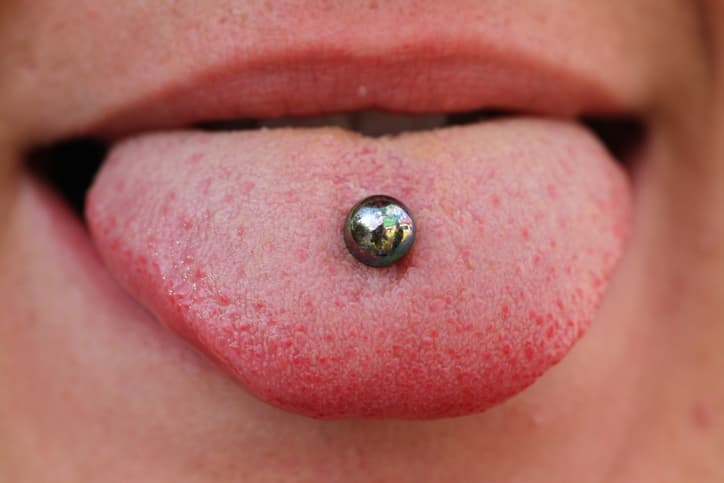
What Causes Infections?
There is a large number of bacteria and other microorganisms in the mouth, and according to a report in The Internet Journal of Allied Health Sciences and Practice (IJAHSP), when the tongue is pierced, microorganisms can enter the wound and cause infection at the piercing site. From the piercing site, the infection may then enter the bloodstream, causing heat and redness beyond the wound, swelling of the lymph nodes, fever and other serious side effects. The report states that lightly brushing the pierced area with a new, soft-bristled toothbrush, may help prevent bacteria from entering the wound.
Healing After Tongue Piercing
After a tongue piercing, normal healing symptoms and healing times vary from person to person. Pain from a tongue piercing can last up to one month, according to the University of Wisconsin Whitewater. Normal healing symptoms as several days of uncomfortable aching, pinching or tightness in the area of the wound, swelling, bleeding and a yellowish, liquid secretion.
Infection Symptoms
Signs of an infected tongue piercing include healing symptoms that persist longer than normal and other indicative symptoms. The American Dental Association advises that medical attention should be sought immediately if there is pain and swelling beyond the normal range. Other symptoms of infection may include fever, chills, shaking or red streaks around the piercing wound.
Untreated Tongue Infections
An untreated infected tongue piercing can lead to severe consequences. An ISRN Dentistry article states that, as well as local infections in the tongue, infections that enter the bloodstream can cause heart problems and brain abscesses. Infectious diseases that could enter through the piercing wound include HIV, tetanus, tuberculosis and hepatitis B, C, D and G.
Treating Infected Piercings
Donna I. Meltzer, M.D., writing in American Family Physician, says keeping the airway open is an important concern when treating an infected tongue piercing. The tongue jewellery is removed if possible, and systemic antibiotics are then administered. It may also be necessary to surgically drain abscesses that have formed.
Tongue piercings carry other risks besides the danger of infection. Possible fractured teeth, nerve damage, speech impediments, allergic reactions to tongue jewellery, scar tissue, prolonged bleeding and disease transmission as some additional risks. When factoring in all of these risks, having your tongue pierced is a decision that must be considered seriously, and close attention must be paid to symptoms of infection afterwards.
